We have created a Inbound Connector and custom Management Pack.
We send data to our SCOM server using .NET SDK examples.
We can see performance data and events on SCOM console.

But when we create Performance report (Reporting > Microsoft Generic Report Library > Performance) we do not see our Performance Counters.

It seem we have a trouble with inserting performance data to DW database.
Please ask me about any additional information which I can provide to solve the trouble.
UPDATE
Our Management Pack source code:
<?xml version="1.0" encoding="utf-8"?><ManagementPack ContentReadable="true" SchemaVersion="2.0" OriginalSchemaVersion="1.0" xmlns:xsd="http://www.w3.org/2001/XMLSchema" xmlns:xsl="http://www.w3.org/1999/XSL/Transform">
<Manifest>
<Identity>
<ID>CloudMonix.ResourceMonitoring</ID>
<Version>1.0.0.0</Version>
</Identity>
<Name>CloudMonix Resource Monitoring Pack</Name>
<References>
<Reference Alias="System">
<ID>System.Library</ID>
<Version>7.5.8501.0</Version>
<PublicKeyToken>31bf3856ad364e35</PublicKeyToken>
</Reference>
<Reference Alias="Health">
<ID>System.Health.Library</ID>
<Version>7.0.8438.6</Version>
<PublicKeyToken>31bf3856ad364e35</PublicKeyToken>
</Reference>
<Reference Alias="SystemCenter">
<ID>Microsoft.SystemCenter.Library</ID>
<Version>7.0.8438.6</Version>
<PublicKeyToken>31bf3856ad364e35</PublicKeyToken>
</Reference>
</References>
</Manifest>
<TypeDefinitions>
<EntityTypes>
<ClassTypes>
<ClassType ID="CloudMonix.ResourceMonitoring.Resource" Accessibility="Public" Abstract="false" Base="System!System.Entity" Hosted="false" Singleton="false" Extension="false">
<Property ID="ResourceId" Type="string" AutoIncrement="false" Key="true" CaseSensitive="false" MaxLength="256" MinLength="1" Required="false" Scale="0" />
<Property ID="ResourceType" Type="string" AutoIncrement="false" Key="false" CaseSensitive="false" MaxLength="256" MinLength="1" Required="false" Scale="0" />
<Property ID="ResourceGroups" Type="string" AutoIncrement="false" Key="false" CaseSensitive="false" MaxLength="1024" MinLength="1" Required="false" Scale="0" />
</ClassType>
</ClassTypes>
</EntityTypes>
<ModuleTypes>
<WriteActionModuleType ID="CloudMonix.ResourceMonitoring.SetStateAction" Accessibility="Internal" Batching="false">
<Configuration>
<IncludeSchemaTypes>
<SchemaType>Health!System.Health.AlertSchema</SchemaType>
</IncludeSchemaTypes>
<xsd:element name="ManagementGroupId" type="xsd:string" xmlns:xsd="http://www.w3.org/2001/XMLSchema" />
<xsd:element name="MonitorId" type="xsd:string" xmlns:xsd="http://www.w3.org/2001/XMLSchema" />
<xsd:element name="ManagedEntityId" type="xsd:string" xmlns:xsd="http://www.w3.org/2001/XMLSchema" />
<xsd:element name="HealthState" type="System.Health.AlertHealthState" xmlns:xsd="http://www.w3.org/2001/XMLSchema" />
</Configuration>
<ModuleImplementation Isolation="Any">
<Native>
<ClassID>44cbc334-8b5f-4cb6-bee0-6bdcbc80e8d5</ClassID>
</Native>
</ModuleImplementation>
<InputType>System!System.BaseData</InputType>
</WriteActionModuleType>
<WriteActionModuleType ID="CloudMonix.ResourceMonitoring.TargetSetStateAction" Accessibility="Internal" Batching="false">
<Configuration>
<IncludeSchemaTypes>
<SchemaType>Health!System.Health.AlertSchema</SchemaType>
</IncludeSchemaTypes>
<xsd:element name="MonitorId" type="xsd:string" xmlns:xsd="http://www.w3.org/2001/XMLSchema" />
<xsd:element name="HealthState" type="System.Health.AlertHealthState" xmlns:xsd="http://www.w3.org/2001/XMLSchema" />
</Configuration>
<ModuleImplementation Isolation="Any">
<Composite>
<MemberModules>
<WriteAction ID="WA" TypeID="CloudMonix.ResourceMonitoring.SetStateAction">
<ManagementGroupId>$Target/ManagementGroup/Id$</ManagementGroupId>
<MonitorId>$Config/MonitorId$</MonitorId>
<ManagedEntityId>$Data/ManagedEntityId$</ManagedEntityId>
<HealthState>$Config/HealthState$</HealthState>
</WriteAction>
</MemberModules>
<Composition>
<Node ID="WA" />
</Composition>
</Composite>
</ModuleImplementation>
<InputType>System!System.BaseData</InputType>
</WriteActionModuleType>
<WriteActionModuleType ID="CloudMonix.ResourceMonitoring.TargetSetSuccessAction" Accessibility="Public" Batching="false">
<Configuration>
<xsd:element name="MonitorId" type="xsd:string" xmlns:xsd="http://www.w3.org/2001/XMLSchema" />
</Configuration>
<ModuleImplementation Isolation="Any">
<Composite>
<MemberModules>
<WriteAction ID="WA" TypeID="CloudMonix.ResourceMonitoring.TargetSetStateAction">
<MonitorId>$Config/MonitorId$</MonitorId>
<HealthState>Success</HealthState>
</WriteAction>
</MemberModules>
<Composition>
<Node ID="WA" />
</Composition>
</Composite>
</ModuleImplementation>
<InputType>System!System.BaseData</InputType>
</WriteActionModuleType>
<WriteActionModuleType ID="CloudMonix.ResourceMonitoring.TargetSetWarningAction" Accessibility="Public" Batching="false">
<Configuration>
<xsd:element name="MonitorId" type="xsd:string" xmlns:xsd="http://www.w3.org/2001/XMLSchema" />
</Configuration>
<ModuleImplementation Isolation="Any">
<Composite>
<MemberModules>
<WriteAction ID="WA" TypeID="CloudMonix.ResourceMonitoring.TargetSetStateAction">
<MonitorId>$Config/MonitorId$</MonitorId>
<HealthState>Warning</HealthState>
</WriteAction>
</MemberModules>
<Composition>
<Node ID="WA" />
</Composition>
</Composite>
</ModuleImplementation>
<InputType>System!System.BaseData</InputType>
</WriteActionModuleType>
<WriteActionModuleType ID="CloudMonix.ResourceMonitoring.TargetSetErrorAction" Accessibility="Public" Batching="false">
<Configuration>
<xsd:element name="MonitorId" type="xsd:string" xmlns:xsd="http://www.w3.org/2001/XMLSchema" />
</Configuration>
<ModuleImplementation Isolation="Any">
<Composite>
<MemberModules>
<WriteAction ID="WA" TypeID="CloudMonix.ResourceMonitoring.TargetSetStateAction">
<MonitorId>$Config/MonitorId$</MonitorId>
<HealthState>Error</HealthState>
</WriteAction>
</MemberModules>
<Composition>
<Node ID="WA" />
</Composition>
</Composite>
</ModuleImplementation>
<InputType>System!System.BaseData</InputType>
</WriteActionModuleType>
</ModuleTypes>
</TypeDefinitions>
<Monitoring>
<Rules>
<Rule ID="CloudMonix.ResourceMonitoring.Monitor.Success" Enabled="true" Target="CloudMonix.ResourceMonitoring.Resource" ConfirmDelivery="false" Remotable="true" Priority="Normal" DiscardLevel="100">
<Category>StateCollection</Category>
<DataSources>
<DataSource ID="DataSource" TypeID="SystemCenter!Microsoft.SystemCenter.SdkEventProvider" />
</DataSources>
<ConditionDetection ID="ConditionDetection" TypeID="System!System.ExpressionFilter">
<Expression>
<SimpleExpression>
<ValueExpression>
<XPathQuery>EventNumber</XPathQuery>
</ValueExpression>
<Operator>Equal</Operator>
<ValueExpression>
<Value>1</Value>
</ValueExpression>
</SimpleExpression>
</Expression>
</ConditionDetection>
<WriteActions>
<WriteAction ID="WriteAction" TypeID="CloudMonix.ResourceMonitoring.TargetSetSuccessAction">
<MonitorId>$MPElement[Name="CloudMonix.ResourceMonitoring.Monitor"]$</MonitorId>
</WriteAction>
</WriteActions>
</Rule>
<Rule ID="CloudMonix.ResourceMonitoring.Monitor.Warning" Enabled="true" Target="CloudMonix.ResourceMonitoring.Resource" ConfirmDelivery="false" Remotable="true" Priority="Normal" DiscardLevel="100">
<Category>StateCollection</Category>
<DataSources>
<DataSource ID="DataSource" TypeID="SystemCenter!Microsoft.SystemCenter.SdkEventProvider" />
</DataSources>
<ConditionDetection ID="ConditionDetection" TypeID="System!System.ExpressionFilter">
<Expression>
<SimpleExpression>
<ValueExpression>
<XPathQuery>EventNumber</XPathQuery>
</ValueExpression>
<Operator>Equal</Operator>
<ValueExpression>
<Value>2</Value>
</ValueExpression>
</SimpleExpression>
</Expression>
</ConditionDetection>
<WriteActions>
<WriteAction ID="WriteAction" TypeID="CloudMonix.ResourceMonitoring.TargetSetWarningAction">
<MonitorId>$MPElement[Name="CloudMonix.ResourceMonitoring.Monitor"]$</MonitorId>
</WriteAction>
</WriteActions>
</Rule>
<Rule ID="CloudMonix.ResourceMonitoring.Monitor.Error" Enabled="true" Target="CloudMonix.ResourceMonitoring.Resource" ConfirmDelivery="false" Remotable="true" Priority="Normal" DiscardLevel="100">
<Category>StateCollection</Category>
<DataSources>
<DataSource ID="DataSource" TypeID="SystemCenter!Microsoft.SystemCenter.SdkEventProvider" />
</DataSources>
<ConditionDetection ID="ConditionDetection" TypeID="System!System.ExpressionFilter">
<Expression>
<SimpleExpression>
<ValueExpression>
<XPathQuery>EventNumber</XPathQuery>
</ValueExpression>
<Operator>Equal</Operator>
<ValueExpression>
<Value>3</Value>
</ValueExpression>
</SimpleExpression>
</Expression>
</ConditionDetection>
<WriteActions>
<WriteAction ID="WriteAction" TypeID="CloudMonix.ResourceMonitoring.TargetSetErrorAction">
<MonitorId>$MPElement[Name="CloudMonix.ResourceMonitoring.Monitor"]$</MonitorId>
</WriteAction>
</WriteActions>
</Rule>
</Rules>
<Monitors>
<AggregateMonitor ID="CloudMonix.ResourceMonitoring.Monitor" Accessibility="Public" Enabled="true" Target="CloudMonix.ResourceMonitoring.Resource" ParentMonitorID="Health!System.Health.EntityState" Remotable="true" Priority="Normal">
<Category>StateCollection</Category>
<Algorithm>WorstOf</Algorithm>
</AggregateMonitor>
</Monitors>
</Monitoring>
<Presentation>
<Views>
<View ID="CloudMonix.ResourceMonitoring.MainView" Accessibility="Public" Enabled="true" Target="CloudMonix.ResourceMonitoring.Resource" TypeID="SystemCenter!Microsoft.SystemCenter.StateViewType" Visible="true">
<Category>Operations</Category>
<Criteria>
<InMaintenanceMode>false</InMaintenanceMode>
</Criteria>
<Presentation>
<ColumnInfo Index="0" SortIndex="-1" Width="100" Grouped="false" Sorted="true" IsSortable="true" Visible="true" SortOrder="Ascending">
<Name>State</Name>
<Id>CloudMonix.ResourceMonitoring.Resource</Id>
</ColumnInfo>
<ColumnInfo Index="1" SortIndex="-1" Width="100" Grouped="false" Sorted="false" IsSortable="true" Visible="true" SortOrder="Ascending">
<Name>Resource Type</Name>
<Id>ResourceType</Id>
</ColumnInfo>
<ColumnInfo Index="2" SortIndex="-1" Width="100" Grouped="false" Sorted="false" IsSortable="true" Visible="true" SortOrder="Ascending">
<Name>Resource Name</Name>
<Id>DisplayName</Id>
</ColumnInfo>
<ColumnInfo Index="3" SortIndex="-1" Width="100" Grouped="false" Sorted="false" IsSortable="true" Visible="true" SortOrder="Ascending">
<Name>Resource Groups</Name>
<Id>ResourceGroups</Id>
</ColumnInfo>
</Presentation>
<Target />
</View>
</Views>
<Folders>
<Folder ID="CloudMonix.ResourceMonitoring.MainFolder" Accessibility="Public" ParentFolder="SystemCenter!Microsoft.SystemCenter.Monitoring.ViewFolder.Root" />
</Folders>
<FolderItems>
<FolderItem ElementID="CloudMonix.ResourceMonitoring.MainView" ID="CloudMonix.ResourceMonitoring.MainView" Folder="CloudMonix.ResourceMonitoring.MainFolder" />
</FolderItems>
</Presentation>
<LanguagePacks>
<LanguagePack ID="ENU" IsDefault="false">
<DisplayStrings>
<DisplayString ElementID="CloudMonix.ResourceMonitoring">
<Name>CloudMonix Resource Monitoring</Name>
</DisplayString>
<DisplayString ElementID="CloudMonix.ResourceMonitoring.MainFolder">
<Name>CloudMonix Folder</Name>
</DisplayString>
<DisplayString ElementID="CloudMonix.ResourceMonitoring.MainView">
<Name>CloudMonix Resource View</Name>
</DisplayString>
<DisplayString ElementID="CloudMonix.ResourceMonitoring.Monitor">
<Name>CloudMonix Health State Monitor</Name>
</DisplayString>
<DisplayString ElementID="CloudMonix.ResourceMonitoring.Resource">
<Name>CloudMonix Resource</Name>
</DisplayString>
<DisplayString ElementID="CloudMonix.ResourceMonitoring.Resource" SubElementID="ResourceId">
<Name>Resource Id</Name>
</DisplayString>
<DisplayString ElementID="CloudMonix.ResourceMonitoring.Resource" SubElementID="ResourceType">
<Name>Resource Type</Name>
</DisplayString>
<DisplayString ElementID="CloudMonix.ResourceMonitoring.Resource" SubElementID="ResourceGroups">
<Name>Resource Groups</Name>
</DisplayString>
</DisplayStrings>
</LanguagePack>
</LanguagePacks>
</ManagementPack>
UPDATE 2
Our source code is very simple:
var customMonitoringPerformanceDatas = performanceDatas
.Select(n => new CustomMonitoringPerformanceData("CloudMonix", n.MetricName, n.Value)
{
TimeSampled = n.TimeStamp
})
.OrderBy(n => n.TimeSampled)
.ToList();
monitoringObject.InsertCustomMonitoringPerformanceData(customMonitoringPerformanceDatas);
UPDATE 3
I have implemented next Rule:
<Rule ID="CloudMonix.ResourceMonitoring.PerformanceData" Enabled="true" Target="CloudMonix.ResourceMonitoring.Resource" ConfirmDelivery="false" Remotable="true" Priority="Normal" DiscardLevel="100">
<Category>PerformanceCollection</Category>
<DataSources>
<DataSource ID="DataSource" TypeID="SystemCenter!Microsoft.SystemCenter.SdkPerformanceDataProvider" />
</DataSource>
</DataSources>
<WriteActions>
<WriteAction ID="WriteToDB" TypeID="SystemCenter!Microsoft.SystemCenter.CollectPerformanceData" />
<WriteAction ID="WriteToDW" TypeID="SystemCenterDataWarehouse!Microsoft.SystemCenter.DataWarehouse.PublishPerformanceDataCustomChannel">
<ChannelId>69173604-6F23-4F98-3383-F3500BA26228</ChannelId>
</WriteAction>
</WriteActions>
</Rule>
I used my custom Connector ID for ChannelId in the Rule.
But I do not see Performance counters unfortunately.
UPDATE 4
I have investigated SCOM DB and saw my trouble. Our data were collected to DW database.
But all our data were collected with ONE RULE ID.
As SCOM uses ONLY ONE RULE ID for all data we can see ONLY ONE PERFORMANCE COUNTER NAME.
How we need to collect properly performance data using SDK?
